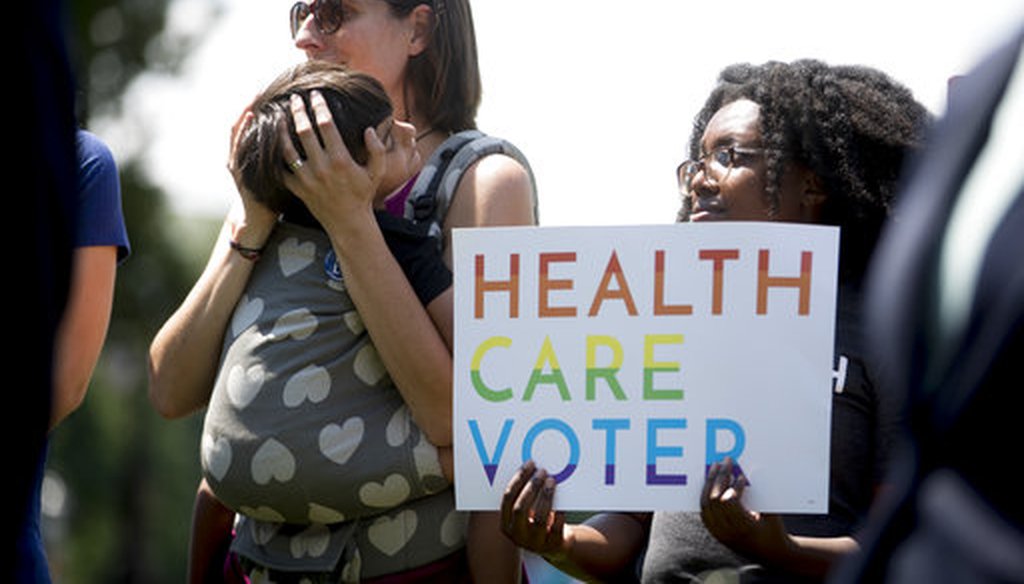Get PolitiFact in your inbox.

Families affected by pre-existing conditions attend a news conference on Capitol Hill in Washington, Tuesday, June 26, 2018. (AP Photo/Andrew Harnik)
Protecting health insurance coverage for pre-existing conditions remains one of the most popular provisions of the Affordable Care Act, but a Florida Democratic leader said it is at risk.
Speaking at a forum sponsored by the Tampa Bay Times, Democratic party chair Terrie Rizzo and her counterpart at the Republican Party of Florida — state Sen. Joe Gruters — debated the parties’ plans for health care.
"Donald Trump and the Republicans have spent the past four years trying to dismantle the ACA. They are doing everything they can — without a plan to replace it I might add — to take away health care plans for millions of Americans," she said. "If they are successful in completely dismantling the ACA, all provisions for pre-existing conditions, there is no guarantee for people who have pre-existing conditions."
Rizzo was referring to a lawsuit filed by Republican attorneys general from multiple states seeking to undo the Affordable Care Act. While impeachment proceedings have dominated recent news, health care remains a top issue for voters heading into the 2020 election. So we wanted to assess the status of efforts to dismantle the Affordable Care Act and its protection for patients with pre-existing conditions.
RELATED: Florida GOP chair twists’ response by Democrats at debate on health care for undocumented immigrants
The Affordable Care Act prevented insurance companies from excluding patients with pre-existing conditions through multiple provisions.
First, the law says point-blank that carriers "may not impose any preexisting condition exclusion." It backs that up with another section that says they "may not establish rules for eligibility" based on health status, medical condition, claims experience or medical history.
Another provision states that while insurers can charge older people more, they can’t charge them more than three times what they charge a 21-year-old policy holder.
A fourth measure lists the essential health benefits that every plan, except grandfathered ones, must offer.
This would all change if the plaintiffs in Texas vs. Azar are successful in their argument that the entire health law should be invalidated.
While efforts by Trump to repeal Obamacare have stalled, the Republicans declawed the individual mandate requiring most Americans to be insured by setting the penalty for not having insurance at zero in the 2017 tax bill.
The Republicans pursuing the lawsuit cite the gutting of the individual mandate as their reason for the broader law being overturned, and a Texas judge in December agreed.
Trump’s Justice Department has refused to defend the Affordable Care Act, so many Democratic attorneys general are defending it instead.
The Fifth Circuit Court of Appeals heard arguments in the case in July. The case could wind up before the U.S. Supreme Court.
The impact of a decision to invalidate the law — and the absence of legislation to provide explicit protections for pre-existing conditions — could vary state to state.
"The residents of Florida would lose the right not to be denied insurance based on their health status, or charged a higher premium due to their health status, gender, occupation or other risk factors," said Sabrina Corlette, a professor at Georgetown University’s Health Policy Institute.
Several other key protections would also be lost, including the ban on annual or lifetime coverage limits, the cap on annual out-of-pocket cost-sharing, and free preventive care, she said.
There are other possible outcomes.
One might be that the Fifth Circuit Court of Appeals decides that the individual mandate could be severed from the rest of the Affordable Care Act, which could mean keeping the protections for pre-existing conditions.
"That is not what the GOP plaintiffs are advocating for, but it is a possible result," said Wendy Netter Epstein, a law professor at DePaul University College of Law.
There are some protections that exist in HIPAA (Health Insurance Portability and Accountability Act) and GINA (Genetic Information Nondiscrimination Act) which mostly protect those who have pre-existing conditions who get employer-sponsored insurance. GINA prohibits insurers from using genetics in coverage decisions.
The Trump administration has taken other steps to undermine the law.
Jonathan Adler, a health law expert at Case Western Reserve University, previously told PolitiFact the structure of Trump’s promise about what his administration "will" do, rather than commenting on what it has done leaves open the possibility of taking other steps to keep pre-existing condition protections in place. Adler has supported previous Obamacare challenges, but he argued that this one is legally unsound.
Spot a claim by a Democrat or Republican politician about health-care or another topic we should fact-check? Email [email protected].
Our Sources
Tampa Bay Times, Florida’s top Republican, top Democrat agree on one thing: 2020 hinges on the Sunshine State, Nov. 6, 2019
NPR, Heads Up: A Ruling On The Latest Challenge To The Affordable Care Act Is Coming, Oct. 12, 2019
Commonwealth Fund, Can States Fill the Gap if the Federal Government Overturns Preexisting-Condition Protections? Oct. 29, 2019
Kaiser Family Foundation, KFF Health Tracking Poll – October 2019: Health Care In The Democratic Debates, Congress, And The Courts, Oct. 15, 2019
Kaiser Family Foundation, Potential Impact of Texas v. U.S. Decision on Key Provisions of the Affordable Care Act, March 26, 2019
Wall Street Journal, How Trump Administration Has Undermined Health Law, Jan. 17, 2019
Center on Budget and Policy Priorities, Sabotage Watch: Tracking Efforts to Undermine the ACA, Oct. 9, 2019
Commonwealth Fund, The ACA Protects People with Preexisting Conditions; Proposed Replacements Would Not, Nov. 1, 2018
USA Today, The end for Obamacare? Trump administration says it will ask a court to throw out entire health law, March 26, 2019
Politico, Trump administration backs court case to overturn key Obamacare provisions, June 7, 2018
Washington Post, Trump surprises Republicans — and pleases Democrats — with push to revive health-care battle, March 26, 2019
New York Times, Trump Tries to Kill Obamacare by a Thousand Cuts, Feb. 21, 2018
Fox News, Health care tops Americans' 2020 election priorities, new Fox News poll shows, Sept. 18, 2019
PolitiFact, Does the GOP's new health care bill still cover pre-existing conditions, as Trump claims? May 1, 2017
PolitiFact, Republican pre-existing protections leave some vulnerable, April 1, 2019
PolitiFact, Pre-existing conditions: Does any GOP proposal match the ACA? Oct. 17, 2018
PolitiFact, Trump’s talk on preexisting conditions doesn’t match his administration’s actions, May 16, 2019
Email interview with Jonathan Adler, professor of Law at Case Western Reserve University, Nov. 7, 2019.
Email interview with Wendy Netter Epstein, professor of law and faculty director at the Mary and Michael Jaharis Health Law Institute of DePaul University College of Law, Nov. 7, 2019.
Email interview with Sabrina Corlette, professor at Georgetown University’s Health Policy Institute, Nov. 7, 2019.
Email interview with Nicholas Bagley, professor at University of Michigan Law School, Nov. 8, 2019.
Email interview with Caroline Rowland, Florida Democratic Party spokeswoman, Nov. 8, 2019












































